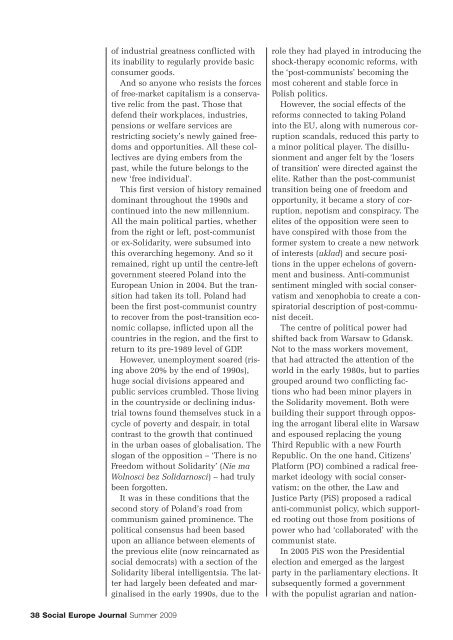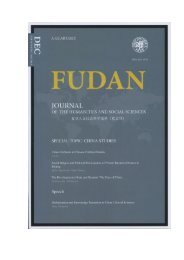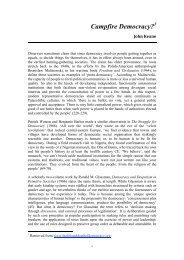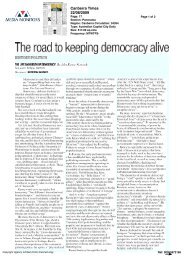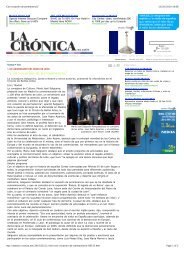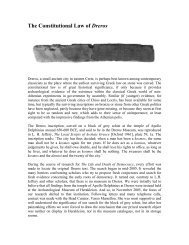The Ethics of Capitalism - Social Europe Journal
The Ethics of Capitalism - Social Europe Journal
The Ethics of Capitalism - Social Europe Journal
You also want an ePaper? Increase the reach of your titles
YUMPU automatically turns print PDFs into web optimized ePapers that Google loves.
<strong>of</strong> industrial greatness conflicted with<br />
its inability to regularly provide basic<br />
consumer goods.<br />
And so anyone who resists the forces<br />
<strong>of</strong> free-market capitalism is a conservative<br />
relic from the past. Those that<br />
defend their workplaces, industries,<br />
pensions or welfare services are<br />
restricting society’s newly gained freedoms<br />
and opportunities. All these collectives<br />
are dying embers from the<br />
past, while the future belongs to the<br />
new ‘free individual’.<br />
This first version <strong>of</strong> history remained<br />
dominant throughout the 1990s and<br />
continued into the new millennium.<br />
All the main political parties, whether<br />
from the right or left, post-communist<br />
or ex-Solidarity, were subsumed into<br />
this overarching hegemony. And so it<br />
remained, right up until the centre-left<br />
government steered Poland into the<br />
<strong>Europe</strong>an Union in 2004. But the transition<br />
had taken its toll. Poland had<br />
been the first post-communist country<br />
to recover from the post-transition economic<br />
collapse, inflicted upon all the<br />
countries in the region, and the first to<br />
return to its pre-1989 level <strong>of</strong> GDP.<br />
However, unemployment soared (rising<br />
above 20% by the end <strong>of</strong> 1990s),<br />
huge social divisions appeared and<br />
public services crumbled. Those living<br />
in the countryside or declining industrial<br />
towns found themselves stuck in a<br />
cycle <strong>of</strong> poverty and despair, in total<br />
contrast to the growth that continued<br />
in the urban oases <strong>of</strong> globalisation. <strong>The</strong><br />
slogan <strong>of</strong> the opposition – ‘<strong>The</strong>re is no<br />
Freedom without Solidarity’ (Nie ma<br />
Wolnosci bez Solidarnosci) – had truly<br />
been forgotten.<br />
It was in these conditions that the<br />
second story <strong>of</strong> Poland’s road from<br />
communism gained prominence. <strong>The</strong><br />
political consensus had been based<br />
upon an alliance between elements <strong>of</strong><br />
the previous elite (now reincarnated as<br />
social democrats) with a section <strong>of</strong> the<br />
Solidarity liberal intelligentsia. <strong>The</strong> latter<br />
had largely been defeated and marginalised<br />
in the early 1990s, due to the<br />
role they had played in introducing the<br />
shock-therapy economic reforms, with<br />
the ‘post-communists’ becoming the<br />
most coherent and stable force in<br />
Polish politics.<br />
However, the social effects <strong>of</strong> the<br />
reforms connected to taking Poland<br />
into the EU, along with numerous corruption<br />
scandals, reduced this party to<br />
a minor political player. <strong>The</strong> disillusionment<br />
and anger felt by the ‘losers<br />
<strong>of</strong> transition’ were directed against the<br />
elite. Rather than the post-communist<br />
transition being one <strong>of</strong> freedom and<br />
opportunity, it became a story <strong>of</strong> corruption,<br />
nepotism and conspiracy. <strong>The</strong><br />
elites <strong>of</strong> the opposition were seen to<br />
have conspired with those from the<br />
former system to create a new network<br />
<strong>of</strong> interests (uklad) and secure positions<br />
in the upper echelons <strong>of</strong> government<br />
and business. Anti-communist<br />
sentiment mingled with social conservatism<br />
and xenophobia to create a conspiratorial<br />
description <strong>of</strong> post-communist<br />
deceit.<br />
<strong>The</strong> centre <strong>of</strong> political power had<br />
shifted back from Warsaw to Gdansk.<br />
Not to the mass workers movement,<br />
that had attracted the attention <strong>of</strong> the<br />
world in the early 1980s, but to parties<br />
grouped around two conflicting factions<br />
who had been minor players in<br />
the Solidarity movement. Both were<br />
building their support through opposing<br />
the arrogant liberal elite in Warsaw<br />
and espoused replacing the young<br />
Third Republic with a new Fourth<br />
Republic. On the one hand, Citizens’<br />
Platform (PO) combined a radical freemarket<br />
ideology with social conservatism;<br />
on the other, the Law and<br />
Justice Party (PiS) proposed a radical<br />
anti-communist policy, which supported<br />
rooting out those from positions <strong>of</strong><br />
power who had ‘collaborated’ with the<br />
communist state.<br />
In 2005 PiS won the Presidential<br />
election and emerged as the largest<br />
party in the parliamentary elections. It<br />
subsequently formed a government<br />
with the populist agrarian and nation-<br />
38 <strong>Social</strong> <strong>Europe</strong> <strong>Journal</strong> Summer 2009


